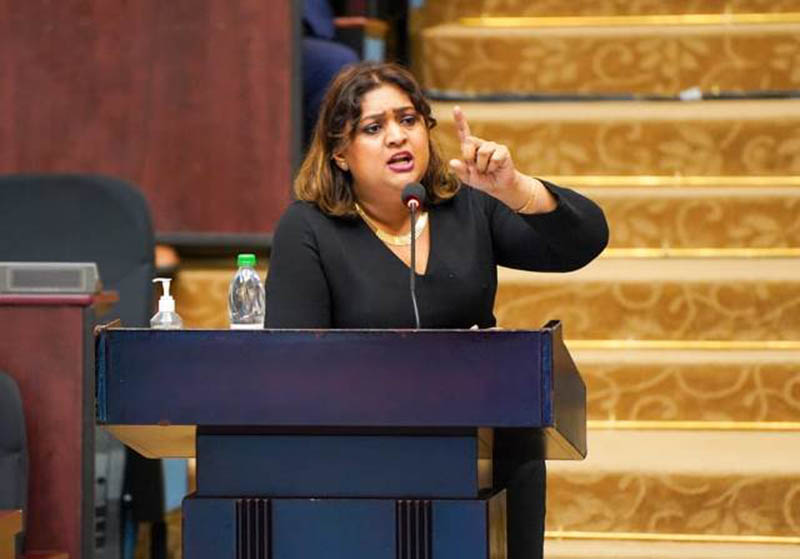Major infrastructure works are expected this year, Minister of Education Priya Manickchand said yesterday in defence of the government’s $94.4 billion allocation to her sector.
Addressing the National Assembly during the second day of the budget debate, Manickchand said the allocated sum paves the way for the construction and rehabilitation of new and existing schools, works on dormitories, and the construction of teachers’ quarters, among others.
In every region, she explained, infrastructural works will be undertaken with new schools being constructed at Hosororo, and Kwebanna, in Region One; Tuschen, East Bank Essequibo and West Bank Demerara; Orealla Corentyne; and Jawalla, Upper Mazaruni. This year’s budgetary allocation, she added, will see the reconstruction of the schools that were destroy-ed by fire and the completion of the Yarrowkabra and Good Hope Secondary Schools. She pointed out too that dormitories will be upgraded and constructed at Paramakatoi and Kopinag in regions Eight and Nine respectively.
Taking a jab at the opposition’s failure to implement such major projects, the Minister noted that the level of investment within the last two and half years by the government is more than what the coalition government spent during their five years at the helm of government.
“In five years, the APNU+AFC did not build one single secondary school. Not one secondary school was started and completed under the APNU+AFC government,” she pointed out as she spoke of the civil works to be funded under this year’s budget.
The Education Minister said that it is necessary that these investments are made now, as she pointed out that the student population has grown from 185,000 in 2019 to 193,000 in 2022.
“Providing access is hugely important to ensuring the delivery of quality education… Education is valuable…” she underscored, positing that the country will see the results of today’s investment in a few years.
According to the Minister, these advances in infrastructure will not only support the sector’s objective to achieve universal secondary education, but will also permanently change the trajectory of any country and fortunes of any family and community to ensure provisions to educate communities and individuals are supported.
Manickchand added that she is open to working with the opposition to move forward in the education sector and urged the opposition side of the House to support the allocation. She stressed that a child’s education should not be used to score cheap political points.
Free university education
Manickchand said that free university education remains part of the government’s promise to the nation. Rebutting opposition members’ questions about free tuition in this budget, she said the manifesto promised to deliver on this in the first term.
“We said very clearly that we are going to find a pathway to remove the debt that students had already incurred, former and current students… and we are going to make the university free in the first five years,” she assured.
She utilised the opportunity to slam the now opposition for not implementing this promise although it was a part of their 2015 manifesto. Manickchand stressed that instead of the coalition government delivering on their promise for free university education, they supported the hike in tuition fees for students. Tuition fees she said climbed drastically as most courses moved from $127,000 to $220,000 by 2020 when her party returned to office.
In response to hecklers while on the floor, she said “Do you know why people are not worried? Because every other promise we made has been fulfilled and so political parties have to have some amount of credibility when they speak.”
Continuing to highlight what Budget 2023 offers, she stated that $3.7 billion will be spent on the production of textbooks. She explained they have seen the benefits of students having access to textbooks from improved performance at the national examination. She added too that through this initiative, parents will be able to have more disposable cash in their pockets.
Turning her attention to the relaunched school feeding programme, the Minister said that 250 persons (241 cooks and nine monitors) were hired to support the programme. Some $2.1 billion has been allocated for this project.
The Minister told the House that no child is being discriminated against in the programme. She chastised the coalition government for poor implementation of the programme and questioned why it was not rolled out to students from areas where sugar estates were shut.
This year’s budget also covers the online rollout of training for teachers via the Cyril Potter College of Education. Some 2,500 teachers will graduate as trained teachers, she explained, as a result of the courses being offered online. Focus is also placed on training teachers in special education needs. The minister said 303 individuals have registered for the programme.
The Minister added that with investments made in the Education Channel, they have 1,800 programmes airing with coverage in over 85% of the country. By the end of this quarter, she said, 100% coverage is expected to be achieved.
“In two years, 1,800 programmes, all the Grade Six concepts and topics, all the Grade Five concepts and topics available now to 85 per cent of the Amerindian villages who never had the Learning Channel before… in the next three months, it is going to be 100 per cent,” the minister assured.
The Ministry of Education has distributed television sets, satellite dishes, and solar-powered systems to hinterland communities to achieve the coverage.






